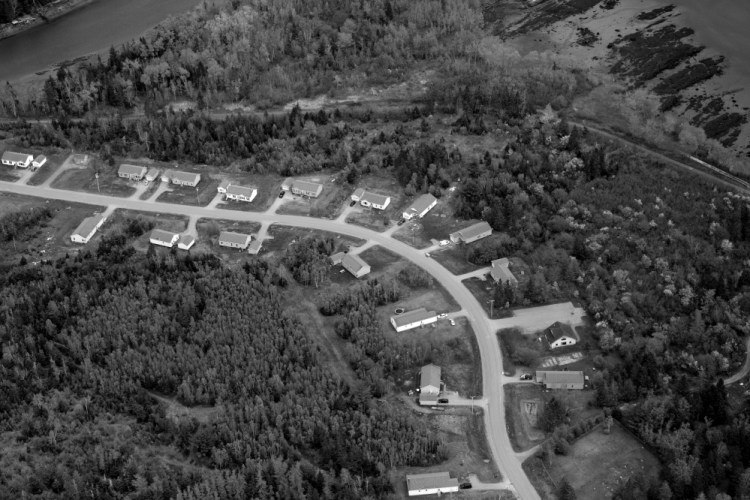If Gov. Paul LePage’s overhaul of the General Assistance program goes through, Portland won’t be the only municipality to feel the pain.
The Passamaquoddy tribe’s two reservations in eastern Washington County would be the hardest-hit communities in the state on a per-capita basis if the Legislature approves the governor’s plan to change the formula by which the state reimburses towns for General Assistance, which pays for food, housing, medical care and other emergency services for the needy.
However, there are questions about the level of Passamaquoddy General Assistance spending, which is high even given the poverty levels on their two reservations. A former tribal chief said General Assistance funds also have been used as political patronage.
Under the governor’s plan, the Indian Township reservation north of Princeton would see a net loss of $157,393 a year – or $219 per inhabitant – according to figures released by the Department of Health and Human Services based on General Assistance expenditures in fiscal year 2014. The Pleasant Point reservation between Perry and Eastport would face a $54,696 cut, or $73 per person. The comparable figures for Portland are $4.3 million, or $66 per person.
“It would definitely be a pretty big blow to us,” said Genevieve Doughty, Pleasant Point’s director of social services, who learned of the severity of the cuts from a reporter. “This would be very unfortunate because we are in a very struggling area. We just don’t have the resources that others who are more fortunate have access to.”
TRIBES’ SPENDING EXTREMELY HIGH
LePage’s proposal is intended to increase incentives for towns to be frugal with relief funds. The state currently reimburses most towns for half of their General Assistance costs up to a certain threshold, after which it contributes 90 percent of the cost; the state’s Indian reservations have received a 10 percent reimbursement up to the threshold and 100 percent thereafter. The governor’s reform would flip the formula for all communities, giving a 90 percent state match up front, but only 10 percent after the threshold is crossed.
“Flipping this reimbursement rate on its head would encourage Maine’s larger cities to manage their GA programs in a cost-effective manner,” Health and Human Services Commissioner Mary Mayhew said in a March 3 statement.
The Passamaquoddy reservations, which are among the poorest communities in the state, will be especially hard-hit because their General Assistance spending is extremely high. Indian Township, population 718, spent $251,425 in fiscal year 2014, over 40 times as much as the Penobscot Nation’s reservation at Indian Island, which is home to 610 people and spent just $6,015.
Princeton, a town of 832 located across a short bridge from Indian Township, spent $9,363 that year.
TRIBAL LEADERS DECLINE TO EXPLAIN
Spending has been high at both reservations for many years. According to DHHS figures, Indian Township has spent more than $129,000 every year from fiscal year 2005 onward, while Pleasant Point has spent at least $63,000.
The Portland Press Herald asked numerous tribal officials – including Indian Township Chief Billy Nicholas and his brother, Vice Chief Leslie Nicholas; Pleasant Point Chief Fred Moore III and Vice Chief Vera Francis; and Pleasant Point council member and informal spokesman Newell Lewey – to explain why Passamaquoddy General Assistance spending is so high. None of them would do so.
Doughty, at Pleasant Point, said she had been on the social services job less than a year and didn’t know the answer.
PATRONAGE USING STATE AID ALLEGED
On the two reservations, the chiefs ultimately determine who does and does not get General Assistance. Allen Sockabasin, who was chief at Indian Township in the mid-1970s, says the funds are given out or withheld as patronage by chiefs at both reservations.
“There’s no criteria of how you get welfare in the community, and therefore it is used for political patronage,” Sockabasin said. “There’s a certain population of our communities, they get more than the ones who really need it.”
If so, the system is modeled on the practices of a series of state Indian agents, who are said to have had the power of life and death over the Passamaquoddy in the early and mid-20th century. In that time, tribal people were wards of the state who were denied the right to vote, the opportunity to find employment, even the right to hunt or cut timber on tribal lands. In the late 1960s, Pleasant Point Gov. George Francis accused the state Indian agent of denying food, firewood, dental care and even children’s milk allowances to Indians who questioned his rule, and claimed the agent’s actions had resulted in deaths by starvation or hypothermia.
Sockabasin says this system was adopted by tribal leaders after the Passamaquoddy regained self-government at the end of the 1970s.
In November 2008, former Indian Township Gov. Bobby Newell was convicted of 29 counts, including conspiring to defraud the United States, misapplication of federal funds, and fraud and lying to federal agencies.
At trial, investigators showed how Newell – who held office from 2002 to 2006 – had used his nearly unchecked power to dole out hundreds of thousands of dollars in “general assistance” payments to friends, family, political supporters and other tribal members. During the last two fiscal years he was governor, the reservation’s General Assistance budget – which witnesses alleged Newell used to grease the wheels of politics – was overspent by a total of $2 million.
“Newell also caused the tribe’s various (federally funded) programs to ‘loan’ hundreds of thousands of dollars each year to the tribe, which he then disbursed in the form of ‘general assistance’ to tribe members, including friends, family and political supporters,” U.S. First Circuit appeals judge Juan Torruella wrote in a 2011 ruling upholding Newell’s convictions. “These loans were by and large never repaid.”
LONG A PRACTICE ON RESERVATIONS
Sockabasin, a political rival of current Indian Township chief Billy Nicholas, says General Assistance money has continued to be used to reward political support under Newell’s successors, and at both reservations. Several other tribal members had made similar allegations previously to the Press Herald about Indian Township, saying impoverished people who crossed elected officials risked losing services or having General Assistance cut off.
Sockabasin said the problem was not as severe at the Penobscots’ Indian Island reservation because it is located near Bangor, the economic hub of eastern Maine, which meant people are far less dependent on tribal government jobs and assistance that could be dispensed through patronage.
TRIBE SPENDING ‘DUE’ FOR AN AUDIT
David Sorensen, spokesman for the DHHS, said the Passamaquoddy reservations were last audited in 2011. “The 2011 GA review was not on-site, it was a series of questions from the state followed by responses by the Passamaquoddy,” he said in an email. “There was no exchange of records or documentation. There were no adverse findings.
“They are due for an on-site review,” he said.
The state’s General Assistance compensation thresholds are based on town property valuations, but Indian reservations have very little taxable property because land is collectively owned. This is why under the current system, the three reservations have opted to use an alternate formula by which they absorb a higher proportion of welfare costs before hitting the threshold.
Under the reform, this second option would be eliminated, Sorensen said.
“The governor’s GA reform proposal is built on the belief that all towns should be treated equally, including reservations,” he said.
Send questions/comments to the editors.



